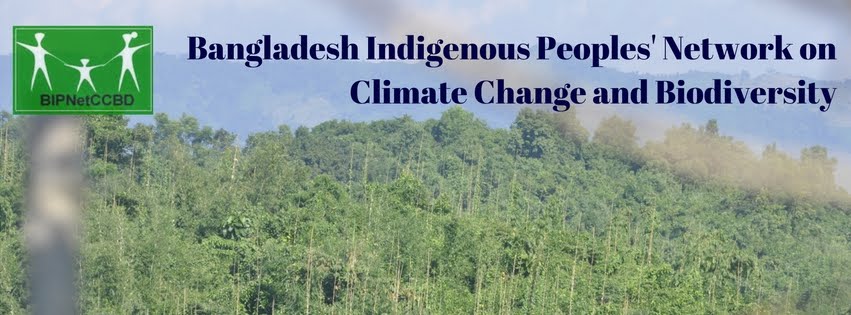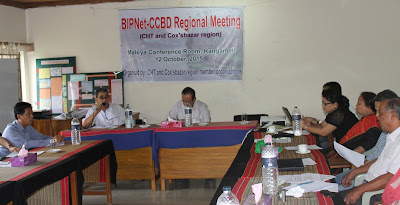Alienation, imposing restriction and discrimination in access to resources and negligence, disrespect and non-recognition of the customary practices of the indigenous peoples are major causes for increasing the poverty and vulnerability among the indigenous peoples of Bangladesh
Rangamati, 12 October 2015: The meeting participants in general have expressed their concern over the increasing numbers of incidents of alienation, imposing restriction and discrimination in access to resources and negligence, disrespect and non-recognition of the customary practices of the indigenous peoples in all over the country. These are causing more of poverty and vulnerability within the communities. The participants of the CHT said that the land grabbing in CHT is still continuing alarmingly. The expansion of Reserve Forest (RF), establishment of new Border Guard Bangladesh (BGB) camps, tourist resorts, leasing out their Jum (shifting cultivation) land areas among the other issues are much highlighted in the meeting. Participants also expressed deep concern over the initiatives of tourism by the various government and private agencies in Rangamati and Bandarban hill district, which may lead to lose of the community’s customary land ownership, traditional livelihood and dilute their culture and practices. The communities, who are small in numbers (i.e. Mro people), will be effected most due to these initiatives. Many of them raise questions about the tourism initiatives for whom? and in what cost?
The participants from Sylhet raised the conflict issue over land ownership between government and Khasi people of Jhimai Punji of Kulawara Upazilla and Nihar Punji of Shreemangal. According to them, the Khasi people have been living in the areas from last 60-70 years. The total area is around 500 acres. More than 110 families Khasi people are living in their ancestral land. The tea garden authority is planning to cut down the big tree of the forest where the Khasi people are cultivating beetle leafs, which is the main sources of their livelihood. They demand for recognition of their traditional customary land ownership and practices and stopped cutting any tree from the areas which they are protecting from long time ago.
The participants from of Khulna region raised the issue of racial discrimination toward the indigenous Munda and Malo people in accessing the forest resources in Sundarban, which is their main source of traditional livelihood that they are traditionally accessing and conserving from long time ago. According to them, the forest authority officers are giving access to the forest products to the non-indigenous communities and creating obstacles or limiting the access of the indigenous Munda and Malo people. Note that around 4500 indigenous Munda and Malo families have been living in this region of Sundarban. Around 90% of them are dependent on forest products.
The representatives of the tea garden communities raised the issue of marginalization, poverty and lack of access to the basic human needs i.e. education, health and shelter. According to him, the population of the tea garden communities is around 600,000 persons. Out of that only 18% (108,000 persons) are permanent labour in 165 tea gardens. More than 82% populations are unemployed.
Mainly indigenous Munda, Orao and Rai people are living in the tea gardens of the Sylhet region. There are only 3 government primary schools, no health facilities for them. The tea garden authority is providing only two small rooms housing facilities attached with a kitchen for a family. The peoples are still practicing their own languages but it is also decreasing and replacing with local Bengali.
Total indigenous Munda 5000 families are living in Sylhet region. Among them 3000 families of indigenous Munda people are living inside the tea garden area. The rest 40% indigenous Munda communities are living in various forest lands. Kalachara Beat of Kamalganj, Sylhet is one of the forest area, where indigenous Munda people lives in. This reserve is severely affected by the plantations, which causes infertilities of the soils of forest lands. The indigenous Munda and Malo people of the areas are assisting to protect the trees of the forest land. They cultivate lemon, pineapple, paddy in around 365 acres of the land. More than 75 indigenous Munda and Malo families are living in the areas.
The day long meeting was chaired by Barrister Raja Devasish Roy, the Chairperson of Bangladesh Indigenous Peoples Network on Climate Change and Biodiversity (BIPNet-CCBD) and facilitated by Mr. Sudatta Bikash Tanchangya, Secretary of BIPNet-CCBD. The representative of Maleya Foundation, who is acting secretariat of BIPNet-CCBD has presented a detailed report of the activities of BIPNet-CCBD. The participants from Dinajpur, Moulabibazar, Khagrachari, Rangamati and Bandarban also shared their issues. More than 33 representatives from more than 20 Indigenous peoples’ organizations from all over country attended the meeting. The meeting was held on 12 October 2015 at Maleya Conference Room, Rangamati.
 |













No comments:
Post a Comment